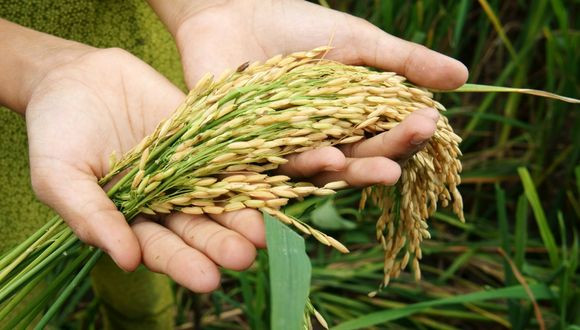Food Security
In the face of ongoing and projected climate change, including higher temperatures and more erratic climate events across extensive regions of the planet, breeding of crop plants with enhanced yield potential and improved resilience to stressful environments is crucial for global food security.
The effect of climate change on crop production are complex and affect yields both directly (e.g., climate‐associated yield instability and biodiversity) and indirectly (e.g., reduced soil fertility and carbon sequestration, as well as changes in microbial activity). To meet the demands of the ever-growing human population, a significant increase in crop-plant (e.g., food, feed, fibers, and bioenergy) production will be needed.
The research at the School of Plant Science and Food Security is using molecular, biochemical, genetic and physiological cutting edge tools for elucidating the mechanisms underlying crop resilience to suboptimal field conditions and developing crops with enhanced resource-use efficiency.
Researchers in this field:
The Shani lab develops next-generation genetics tools that enhance basic plant research and crop resilience. To uncover “hidden” traits that are important for plant resilience and food security, we developed the Multi-Knock technology - the first genome-scale multi-targeted CRISPR libraries in plants. Multi-Knock can be applied to most crops and all breeding traits. Therefore, we expect the new toolbox we develop here to transform how scientists and breeders perform genetics. We utilize the next-generation genetics CRISPR libraries to reveal and characterize transport mechanisms of the main plant hormones - abscisic acid, auxin, cytokinin, and gibberellin. We study how subcellular, cell-to-cell, long-distance hormone movement, and local hormone sinks trigger or prevent hormone-mediated responses. In these studies, we utilize a range of approaches and methods, including plant genetics, plant biotechnology, genome editing, genome-scale CRISPR libraries, plant physiology, response to drought and salt, and fluorescent microscopy.
Lab Website: https://www.shanilab.sites.tau.ac.il/
Prof. Shaul Yalovsky
Research in my laboratory focusses on the interfaces of development and cell biology with abiotic stress responses in plants. We study signaling mechanisms that increase plant tolerance to drought and salt stress and increase water use efficiency. We are also interested in signaling mechanisms that regulate secondary cell wall formation in plants and the regulation of lignin content with the aim of developing crops with reduced cell wall recalcitrance toward biofuel formation. In our research, we use cell and molecular biology, biochemistry, and physiology methods such as CRISPR-mediated genome editing, confocal and light microscopy, RNA-seq, DNA-seq, protein-protein interaction, and gas exchange.
Lab Website: https://www.yalovskylab.sites.tau.ac.il/
Prof. Amir Sharon
Our lab has two main research areas: (1) Biology of plant pathogenic fungi and their interactions with plants, (2) Isolation of disease resistance genes from wild species and their use in development of disease resistant wheat. In the first project we study the interaction of the plant pathogenic fungus Botrytis cinerea with plants (Bi et al., 2022). We use molecular genetics as well as plant pathology approaches to obtain deep knowledge of the molecular mechanisms that regulate Botrytis – plant interactions (Bi et al., 2021) and use it for development of alternative disease control methods that will help reducing the use of synthetic fungicides. In the second project we use advanced genomic methods to isolate new disease resistance genes from a collection of wheat wild relatives (Avni et al., 2022; Yu et al., 2022a,b). We use genetic transformation and gene editing methods to generate disease-resistance wheat.
Lab Website: https://www.amirsharonlab.sites.tau.ac.il/
Dr. Nir Sade
My lab research is focused on important agricultural traits which are highly effected by abiotic stress such as water movement (hydraulics), water use efficiency, root morphology and carbon/nitrogen allocation. In my lab, efforts are underway, to both discover the genes that regulate those traits as well as to generate crops with better tolerance to harsh conditions. In addition to common molecular and biochemical tools, we use advanced systems for phenotypic characterization of crop plants, including pressure cells, lysimeter systems, systems for measuring gas exchange, and hyperspectral cameras.
Lab Website: https://nirsade1978.wixsite.com/nirsadelab
Dr. Yosef Fichman
Plants respond to changes in their environment to survive and grow. When one part of a plant is stressed, the whole plant responds within minutes. This is called systemic acclimation, a process by which plants adjust their metabolism, physiology, and biochemistry to adapt to changes in their growth conditions or environment.
Our research focuses on the molecular mechanisms on of systemic acclimation to light and other abiotic stresses. We study how signals such as reactive oxygen species, calcium, and membrane depolarization spread rapidly within cells and from cell to cell. We also investigate how these signals affect amino acid metabolism, which plays a role in acclimation.
To answer these questions, we use a variety of methods, including molecular biology, genetic screens, imaging, physiological assays, and omics.
My lab aims to reveal how plants utilize protein breakdown to adjust molecular signaling cascades and facilitate growth responses to abiotic changes. We specialize in protein-protein interactions, employ CRISPR/Cas9 for genome editing, and baculovirus-based systems for expressing and purifying plant proteins.
Lab Website: https://tallior.wixsite.com/tal-lab





